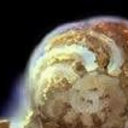Methane-rich saline protects against concanavalin A-induced autoimmune hepatitis in mice through anti-inflammatory and anti-oxidative pathways.
Paraules clau
Resum
Methane is a common gas which has been reported to play a protective role in organ injury and presents an anti-inflammatory property. However, its effects on Concanavalin A (Con A)-induced autoimmune hepatitis (AIH) remain unknown. Thus, the aim of this study was to investigate the effects of methane on Con A-induced autoimmune hepatitis in mice and its underlying mechanism. Autoimmune hepatitis was induced by Con A (15 mg/kg) in healthy C57BL/6 mice and methane-rich saline (MS) (20 ml/kg) was intraperitoneally injected 30 min after the challenge with Con A. We found that methane treatment significantly reduced the elevated serum aminotransferase levels and ameliorated liver pathological damage. Furthermore, methane treatment obviously suppressed the secretion of proinflammatory cytokines including tumor necrosis factor-α (TNF-α), interferon-γ (IFN-γ), interleukin-6 (IL-6) and interleukin-1β (IL-1β) and increased anti-inflammatory cytokine interleukin-10 (IL-10). Moreover, we found that the levels of malondialdehyde (MDA) and 8-hydroxy-2'-deoxyguanosine (8-OHdG) were highly increased while the activities of superoxide dismutase (SOD) and catalase (CAT) were decreased in liver with the injection of Con A, which was reversed by methane. Also, the data demonstrated that the phosphorylated IκB, NF-κB and P38 MAPK in liver were significantly down-regulated by methane. These results suggested that methane protected liver against Con A-induced injury through anti-inflammatory and anti-oxidative pathways.




